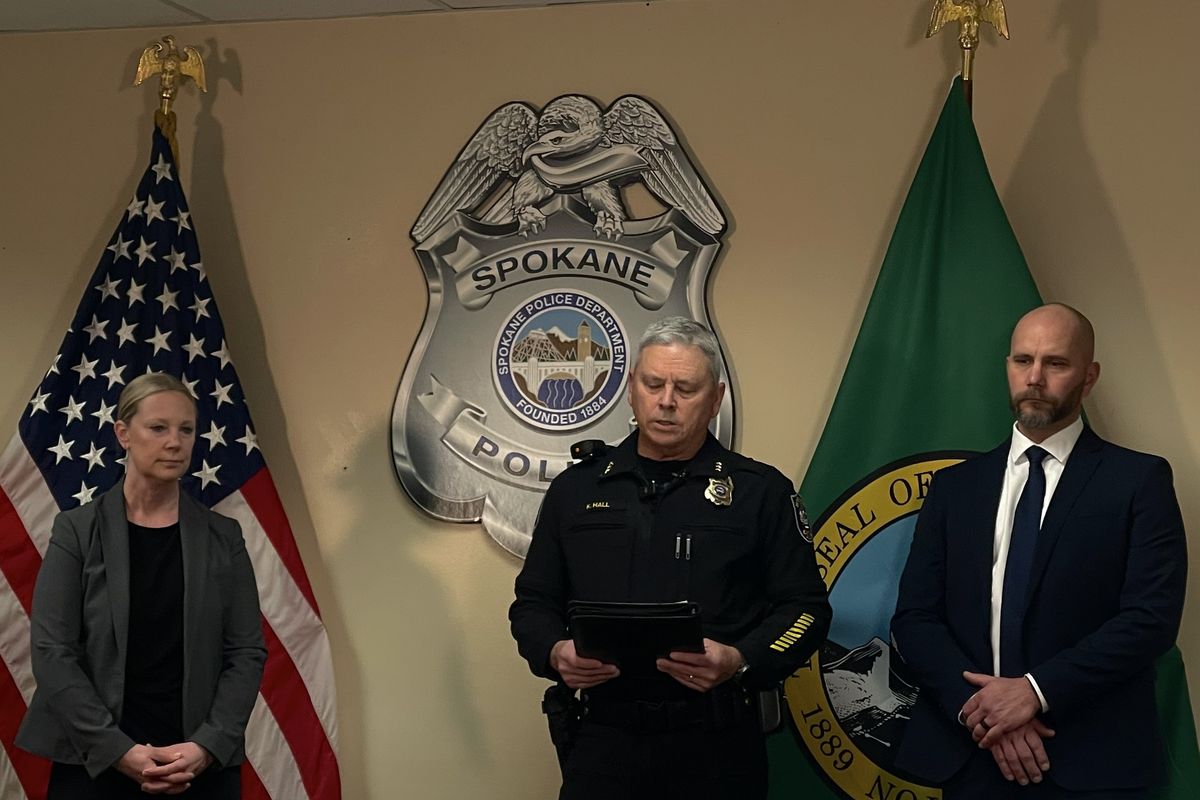Outraged Spokane police chief calls for change after 13-year-old’s shooting death: ‘Our children are dying’
Spokane Police Chief Kevin Hall speaks at a press conference Wednesday, Jan. 29, about addressing gun violence in Spokane following the shooting death of 13-year-old Gavin Looper over the weekend. (Alexandra Duggan / The Spokesman-Review)
The person who peppered the back door of a North Spokane home Saturday with five bullets in an apparent targeted attack killed a 13-year-old boy quietly playing video games on the other side.
As Gavin Looper, a Peperzak Middle School student, lay bleeding, his brother and father held his body and told him to fight. He died an hour later.
“The community should be outraged,” Spokane Police Chief Kevin Hall said in a media conference Wednesday. “Our children are dying at the hands of gun violence.”
Gavin’s death is among the list of those affected, hurt or killed by gun violence in Spokane – he marks the first shooting death in the city limits this year, according to previous Spokesman-Review reporting. But the issue of gun violence, Hall said, is something he rarely hears about in the community. Hall tends to hear concerns about lower-level crimes, drugs and homelessness instead.
“We have to address it,” he said about gun violence. “We need to address it.”
Gavin did not have a gun when he was killed. He also was not engaged in any criminal behavior, Hall said. His mother, Renee Rogers, claims he was merely up late around 2:40 a.m. playing video games at his father’s friend’s home. His older brother was watching a movie, and his father was in another room. Five gunshots rang out, and other people in the house fled into the street, screaming the boy had been shot.
Missoula Police Department arrested 25-year-old Glen “Dylan” Burkey in connection to the killing on Wednesday afternoon. He is awaiting extradition to Spokane. Police believe the shooting was not a random act, according to a previous news release.
“The loss of Gavin Looper is a stark reminder of the devastating impact of gun violence,” Hall said. “Our hearts go out to his family, his friends and school.”
The data
There were nearly 100 shootings in the city last year, Hall said. Of those, 45 people sustained some type of gunshot injury.
Of the 19 homicides tallied by Spokane Police Department in 2024, 10 involved guns, according to Lt. Nathan Spiering.
“We are noticing an ongoing trend, not just here in Spokane, but across the country, where our offenders in gun violence are becoming increasingly more youthful,” Hall said. “This is concerning to all of us, and should be concerning to the entire community. Where these folks are getting their guns and how they’re utilizing these guns at very, very young ages is an issue.”
The most recent data from the FBI, from 2018 through 2023, shows 36% of homicides reported by the Spokane Police Department involved a handgun, and 20% of homicide offenders in the city are ages 10-19.
The same data indicates the same age group makes up 8% of the city’s victims.
According to the Centers for Disease Control and Prevention, firearm homicide rates are highest among teens and young adults. They are also the highest among Black, Latino, American Indian or Alaska Native persons. Statistically, nearly two out of 10 people suffer nonfatal firearm injuries, and more than seven out of 10 firearm injuries are related to assaults, the CDC says.
Spokane’s homeless population, about 2,021 people as of 2024, does not make up most gun violence offenders. While there is a stigma that homeless people commit more crimes, Hall said it is typically only lower-level crimes, open-air drug use or street drug trafficking. FBI data shows most homicides involving guns in Spokane occur within a home.
“As far as gun violence, that is generally a whole different group of offenders,” Hall said.
Spokane was also rocked by the shooting death of a 3-year-old girl 24 years ago.
Pasheen Raya-Bridges died on Feb. 9, 2001, when numerous shots were fired into a north Spokane home. Three men were trying to kill someone who was inside the house with Pasheen at the time, according to previous reporting from The Spokesman-Review. Prosecutors believed the shooting to be drug- and gang-related.
Anthony L. Wright was sent to prison in 2002 for the rest of his life in a 134-year sentence for his role in killing Pasheen.
The strategy
Since before the city’s police chief was confirmed for the job, Hall told city officials and the Spokane community in a forum last year he was adamant about using evidence-based policing strategies and data-driven analysis to go about leading the department and fixing any known issues.
The department’s 2025-2026 strategic plan, with Hall at the helm, aims to decrease gun crime citywide by 10% over the next two years. Among those strategies are place-based policing, or “hot spot policing” – placing officers in areas of high crime – and identifying frequent offenders, as well as identifying and addressing underlying causes of crime, like behavioral health.
The plan also aims to shorten 911 response time; implement technology, like license plate recognition software, to improve police investigations; and increase diversion of unneeded police resources to other areas such as the Behavioral Health Unit, made up of three police officers, three deputies, a police sergeant and three clinicians.
Hall’s first step is “to treat every shooting like a homicide” to effectively reduce more down the road, since there is usually a 50% chance someone involved or affected by gun violence will be the victim or offender in another shooting within 12 months, he said.
Multiple shootings are also usually tied back to one gun or one offender, Hall said.
Shootings in Spokane are also the result of a wide array of different crimes or interactions, according to Lt. Spiering. A shooting could follow domestic violence, be related to drugs or just an argument between two people who may know each other. Several incidents over the course of the last year have been linked together in some way, however, Spiering said.
“Things like this are not random acts. There is some type of target, some type of interaction, or previous interaction, between the suspects and the victims,” Spiering said.
Hall is calling on the people of Spokane to work with the department in an effort to reduce gun violence. But some people don’t always call the police, because they may second-guess themselves or think law enforcement won’t show up. But the 911 calls are what will be used in data-analysis to determine where to allocate police resources, the chief says.
“Keep calling,” Hall said. “… If you don’t call 911, we don’t get that information.”
Asked about how resources will be diverted within an understaffed and overwhelmed police department that has cut its Violent Crimes Task Force, restructured its traffic unit and whittled down its neighborhood resource officer program, Hall is adamant that the department will have to triage the resources they already have. He feels compelled to prioritize those resources in an effort to bring down gun crime, he said at the news conference.
“Quite frankly, I just have to put this out there – It’s the sanctity of human life,” Hall said. “And my priorities are going to be saving people’s lives.”

